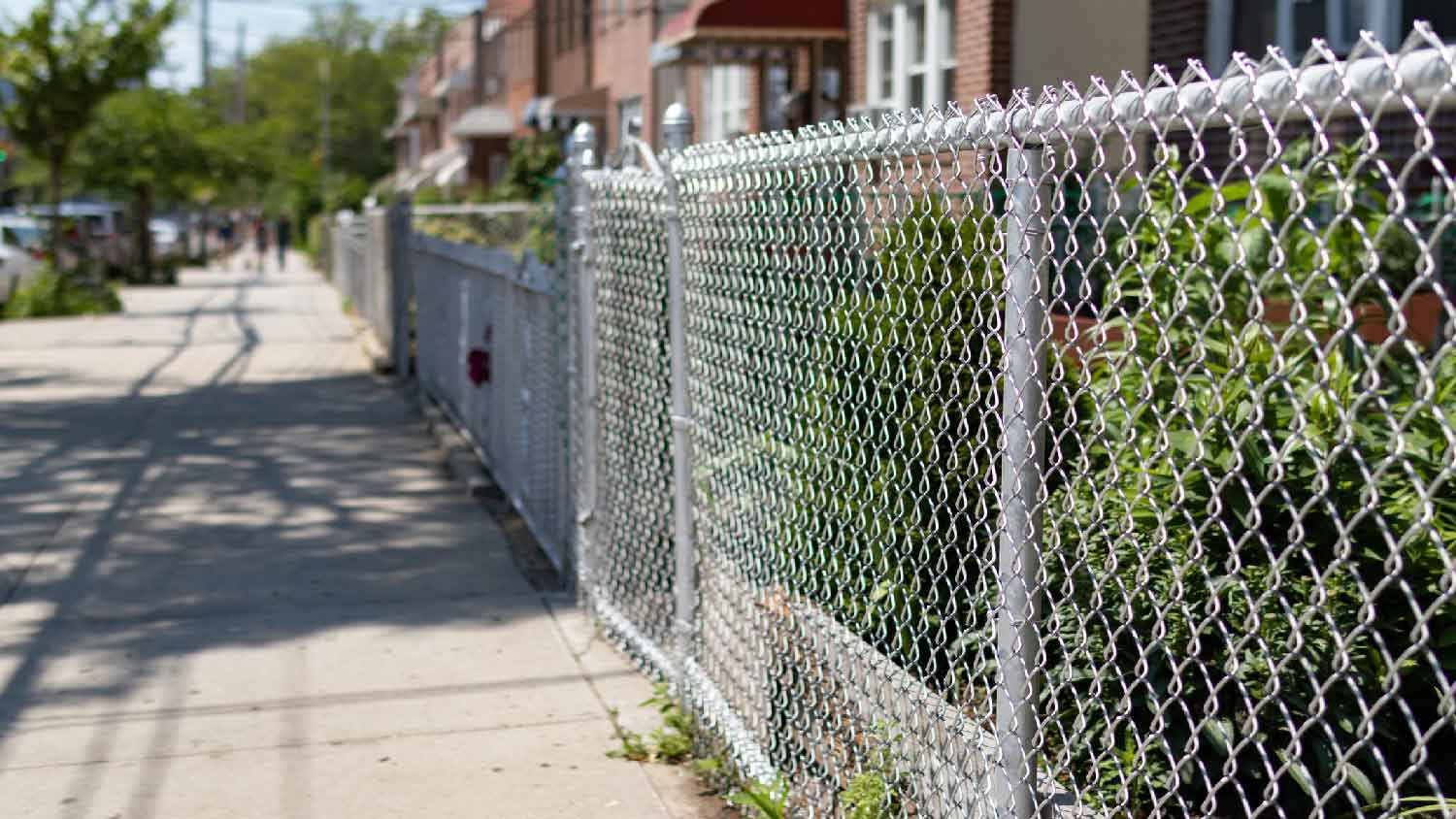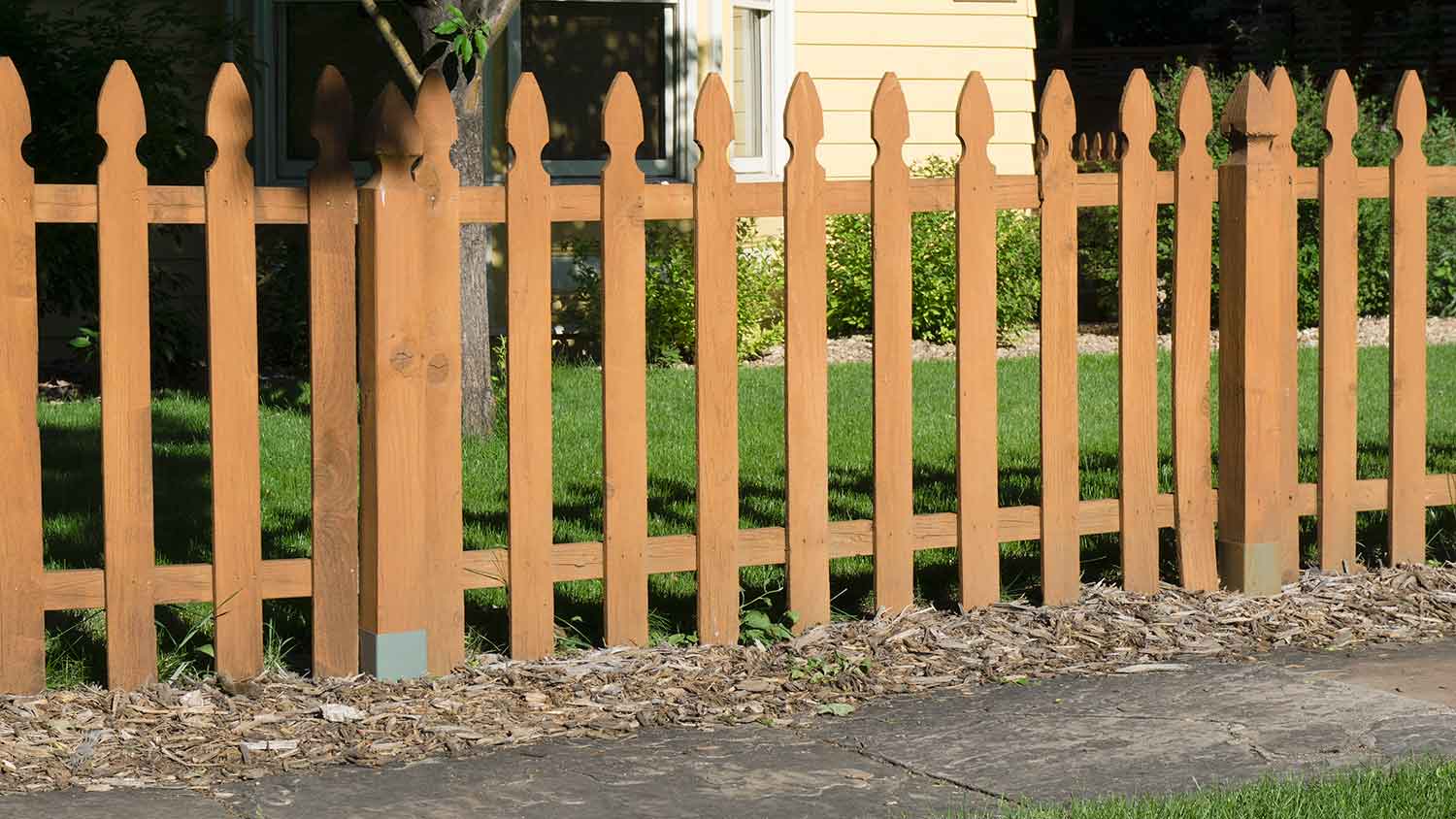5 Best Types of Chain Link Fences: Which Is Right for You?
Don’t feel fenced in by your options


You’ve decided on a chain link fence for your property. Good call! These fences are durable and versatile and are typically less expensive to install per linear foot than wood and vinyl. However, installing any kind of fencing is an investment, so you’ll want to know about the different types of chain link fences and their purposes before you buy.
But first, check the legality of installing a chain link fence in your yard. Some areas have zoning laws, neighborhood associations, and municipal codes to prevent installation. For example, a historic district may not allow these fences for historical accuracy and aesthetics. Before moving forward, you may also need a permit and an expert understanding of easements and property lines.
Let's start on the right side of the fence by reviewing your best options.
1. Galvanized Chain Link Fences

Galvanized chain link fences are the most common type in residential and commercial settings, and for good reasons. They are remarkably corrosion-resistant and have a lifespan of 30 years with little to no maintenance. For residential use, like enclosing a backyard or creating a boundary, a chain link fence with a gauge of 11.5 or 12 is usually sufficient. This type of fence offers a good balance of strength and affordability at $1.50 to $7 per square foot for materials—cheaper than wood or vinyl options.
Pros
Durability: Hot-dip galvanizing creates a robust zinc-steel bond for long-lasting protection against the elements and superior strength.
Cost: They are budget-friendly, ranging from $8 to $40 per linear foot, including materials and installation.
Lifespan: With proper installation, including concrete-set posts and tension bands for stability and rigidity, a fence can last for decades with minimal maintenance.
Transparency: The open mesh design of chain link fences allows for visibility, which can be advantageous if you want a boundary for a garden you can see through.
Cons
Aesthetic appeal: They have an industrial look, which can make them less appealing in residential areas.
Limited privacy: With an open mesh pattern, these fences do not provide privacy.
Long-term appearance: While highly corrosion-resistant, galvanized steel may become dull or weathered over time.
Noise: Fences without tension bands for rigidity can be noisy when touched or subjected to wind.
Gaps in mesh: While they provide security by marking boundaries, a standard mesh size of 2 inches may allow small animals to pass through.
DIY challenges: Installing chain link fences can be labor-intensive, and getting the fence posts plumb and properly tensioned can be challenging for inexperienced DIYers. It’s best to hire a local fence pro to install it for you.
Coastal areas: High salt content in the air may cause these fences to corrode over time—reducing a fence's lifetime by up to 10 years.
2. Vinyl-Coated Chain Link Fences

Vinyl-coated chain link fences combine the strength and durability of galvanized steel with a coating for even more long-lasting protection. This extra layer offers several advantages that make this fence type popular, but it also comes with a few cons.
Pros
Aesthetic appeal: The vinyl coating comes in various colors, including black, white, green, and brown, so you can select a fence that works for your property's aesthetics and looks less industrial than uncoated metal.
Enhanced durability: The vinyl coating protects against rust and corrosion, ensuring a fence can last 15 to 20 years.
Safety and comfort: The vinyl coating creates a smooth surface that is less likely to cause injuries or snag clothing, making it a safer option for homes with children or pets.
Low-maintenance: Like galvanized chain link fences, vinyl-coated chain link fences are low-maintenance, requiring occasional cleaning to maintain their appearance.
Cons
Cost: Vinyl-coated chain link fences cost more than their galvanized counterparts, ranging from $15 to $45 per linear foot for materials and labor.
Repairs: While vinyl-coated fences are generally low-maintenance, they can be prone to scratches and nicks that may expose the underlying metal, resulting in repairs or replacement.
Long-term appearance: Over an extended period, exposure to sunlight and other weather conditions may cause the vinyl coating to fade or become discolored.
Extreme cold: The vinyl coating can become brittle and crack or chip in regions with frequent below-freezing temperatures (think areas like Fairbanks or Duluth).
3. Privacy Chain Link Fences

For those who want the benefits of a chain link fence while enjoying some seclusion, privacy chain link fences are an ideal choice. These fences feature slats or fabric that block the view from the outside while retaining the durability of traditional chain link fencing. The coverings are added after installation and are typically easy to DIY.
Pros
Customization: You can choose from various coverage options, including vinyl slats, privacy screens, or windscreen fabric, allowing you to tailor the level of privacy to your preferences.
Security: Privacy chain link fences provide extra protection by blocking peering eyes and keeping small animals out.
Cost-effective: They are a more economical way to achieve privacy in your outdoor space than features like composite fencing panels, with an average cost of $28 per linear foot.
Durability: The coverings won't impact the lifespan of a chain link fence—plus, they may add a little extra protection from the weather.
Quick installation: Depending on the covering you choose, they are a cinch to install, typically via grommets that are zip-tied into place.
Cons
Reduced airflow and light: Privacy chain link fences, by design, restrict airflow and natural light from passing through.
Trapped debris: Because they block airflow, these fences may trap leaves, debris, and dust near the fence line, leading to additional maintenance to keep the area clean.
Aesthetics: While privacy chain link fences provide seclusion, some homeowners may find them less aesthetically pleasing than other privacy fence options, such as wood or vinyl.
Additional materials: Compared to other types of chain link fences, adding privacy screens means an extra expense, with screens costing around $70 for an 8-foot-by-50-foot roll.
4. Mini-Mesh Chain Link Fences

The pattern of these fences gives a smaller opening measuring from 1/4" to 1 inch rather than the standard 2 inches. These smaller diamond shapes make them an excellent choice for applications where security and containment are essential. Although the openings are smaller, the standard gauge for residential use of 11 to 12 still applies.
Pros
Enhanced security: The smaller mesh openings make it challenging for intruders to scale or cut through the fence.
Blocks small animals: Mini mesh is more effective at keeping out small animals like rodents and rabbits, making them a good choice for properties with gardens.
Durability: These fences retain the durability of standard chain link fences, ensuring long-term protection and containment.
Minimal maintenance: Like standard chain link fences, mini mesh chain link fences require minimal maintenance, making them a cost-effective, long-term solution lasting up to 30 years.
Privacy: The small mesh limits visibility, offering a little privacy from neighbors and busy roads.
Cons
Limited visibility: The smaller mesh openings in mini mesh chain link fences limit visibility into and out of the property.
Cost: Smaller diamond sizes mean more material—a 1" x 1" diamond hole can increase the material cost to $8 to $15 per linear foot.
Trapped debris: Even though the fence is low maintenance, smaller openings may trap leaves, debris, and dust near the fence line, requiring monthly cleaning.
5. Security Chain Link Fences

Security chain link fences are designed with reinforced features to provide maximum security and deter unauthorized access. They use thicker gauge steel wire sizes 6 to 9, usually reserved for industrial and commercial use. If legal in your area, you can opt for barbed or razor wire for even greater security. Topping off a security chain link with the material can deter trespassers. The cost of barbed wire fence material ranges but typically starts at around $29 for a 50-to-60-foot roll.
Another feature, considered an add-on, is an industrial-strength privacy screen for a security chain link fence. These screens are made of denser material above 260 grams per square meter (GSM) and come with heavy-duty steel or brass grommets. They not only enhance privacy but also deter climbing. An 8-foot-by-50-foot roll starts at around $100.
Pros
Increased height: Security chain link fences are typically taller than standard fences—a 10-foot tall fence ranges between $17 to $40 per linear foot.
Anti-climb features: Most security fences use mini-mesh—the small openings make scaling more difficult, enhancing security and preventing small animals, like bunnies, from entering the yard.
Privacy: The small mesh limits visibility, offering a little privacy from neighbors and busy roads, which you could enhance with a security privacy screen.
Cons
Thicker gauge metal costs: These fences use thicker gauge steel than the standard 11 to 12 gauge for residential use, adding around $3 per linear foot to the price, bringing up your cost to $10 or more.
Smaller mesh costs more: In addition to the thicker gauge, the smaller-sized pattern of these fences may increase your total.
Aesthetics: As you can imagine, all this extra hardware makes for a very intimidating fence—great for deterring intruders but not for curb appeal.
Restrictions: As with barbed wire, this kind of high-security fence may be restricted or prohibited in your area. Check local regulations and with your HOA before installing.
Which Fence Is Best for You?
No matter which type of chain link fence you opt for, you should base your decision on your property's purpose, budget, desired level of security, aesthetic preferences, and local regulations. By carefully weighing these factors, you can make an informed choice that ensures your fence meets your immediate requirements and provides long-term satisfaction and value for your property.




- Chain Link Fence vs. Wood Fence: Pros, Cons, Costs
- The Best Low-Maintenance Fence Options for Your Home
- How to Paint a Chain Link Fence in 3 Steps
- How to Repair a Chain Link Fence: An Essential DIY Guide
- 8 Types of Metal Fences for Yards, Pools, and More
- 11 Types of Fences for Added Privacy in Your Yard
- How to Make a Chain Link Fence Private: 8 Inexpensive Ways
- 6 Tips for Choosing the Best Fence for Your Yard
- How to Remove a Chain Link Fence Without the Help of a Pro
- 30 Front Yard Fence Ideas to Welcome You Home










